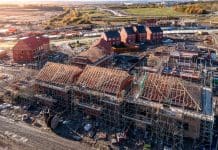How confident are you about the outlook for the British construction industry post-Brexit? That was the question we posed to our readers over the course of August and we received hundreds of responses from people working across the architecture, engineering and construction sectors
Shortly after Boris Johnson took over as Prime Minister, he pledged to the House of Commons that the UK will leave on 31 October “do or die”.
Yet, despite the PM’s apparent resolve, to say there is still an uncertain outlook for Brexit would be an understatement. Will there be a negotiated exit or a no deal? The Prime Minister himself had previously put the likelihood of a no deal at a “million to one” yet at the recent G7 summit he rated the chances of reaching a withdrawal agreement as only “touch and go”.
Further complicating matters, an alliance of Labour, the SNP, the Liberal Democrats, Plaid Cymru and Green MP Caroline Lucas have vowed to block a no deal exit. Could there yet be another change of government as a result of a no confidence vote? Could parliament be prorogued to remove any remaining opposition to leaving without a deal? Will there be a caretaker, temporary, emergency or national unity administration to ensure no deal doesn’t happen? The picture gets seemingly more complex by the day, if no by the hour.
As BIM Today was going to press, the Prime Minister had asked the Queen to suspend parliament from 10 September ahead of a new Queen’s Speech in mid-October.
Whatever the outcome on 1 November, construction is undoubtedly one of the industries most exposed to ups and downs of the Brexit process. It is considered a bellwether of the wider economy and often among the first to suffer in a downturn, with many companies already operating on razor-thin margins.
Construction accounts for 17% of all UK businesses, employs around 2.5m and contributes £113bn to the economy – around 6% of GDP.
With recent research from Begbies Traynor showing the number of companies involved in the development of building projects that are in financial distress rose by 10% year-on-year to 13,018 in the first quarter of 2019, it seems many are already on shaky ground.
The results
To be clear, this survey did not seek to re-run the referendum. This was not about debating the pros and cons of leaving the European Union. We wanted to gauge the confidence of professionals working in architecture, engineering and construction about the prospects for the industry assuming the UK exits on 31 October.
Nearly two-thirds (65.2%) said they are either concerned or highly concerned about the outlook for the industry post-Brexit.
Some 17.3% were confident, with 8.4% highly confident in the sector’s prospects.
Uncertainty about the process and how Brexit will finally look was widespread, with respondents raising concerns about the future status of EU workers, as well as continuing access to labour and materials from Europe.
There were also concerns about the falling strength of the pound against the euro, higher costs and the potential for new trade tariffs being introduced once we leave.
Respondents also cited Brexit uncertainty as a factor in delaying investment decisions by clients.
“The government have not provided detailed information on support for the industry after Brexit for either scenario,” said one housing strategy officer.
Some said they have already seen an impact on labour and materials.
“Already noticing a shortage of skilled technical staff from elsewhere in Europe within our own sector. [A] predicted slump in the economy will have an impact on publicly funded projects,” said a director working in architecture.
A director in project management said: “The construction industry has already seen a dip in labour from across the pond and also uncertainty surrounding material costs – and the uncertainty will remain until we have left the EU for a number of months.”
One architect said: “The construction industry is precarious at the best of times and heavily reliant on overseas labour and skillsets. Even a small period of upheaval will inevitably cause disruption and job uncertainty, with investors less likely to green light new projects in the short term.”
However, some were confident that once Brexit is implemented, the industry will have a clear path forward and a more global outlook.
A company owner working in the engineering sector said: “When we leave the EU as per the referendum result at the end of October, we will have a direction and certainty as to what we need to do as a country.
“We will still be a vibrant economy that attracts investors more from across the globe rather than just the EU. We will be free to seek new trading relations with the rest of the world, which in the long run will prove positive for our economy.”
While not a lone voice, this sort of optimism was in the minority – fewer than one in 10 respondents declared themselves highly confident in their outlook post-Brexit, with most predicting a downturn in the economy and difficult times ahead.
A manager working in design engineering wrote: “Leaving the EU will impact the UK economy and there tends to be a direct correlation between recession and the level of activity in the construction sector.
“A no deal Brexit is now being actively considered; this will have a very significant and long-lasting economic impact.”
BIM Today
Tel: 0843 504 4560














